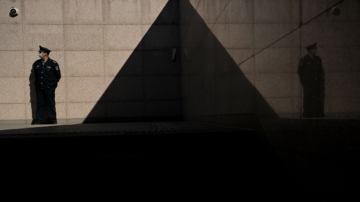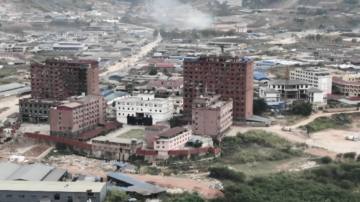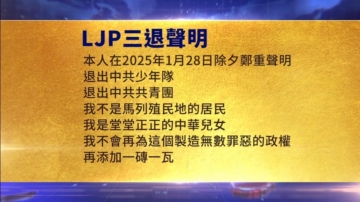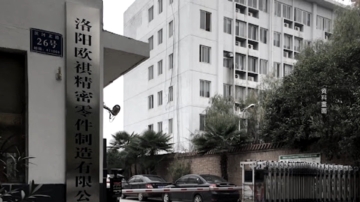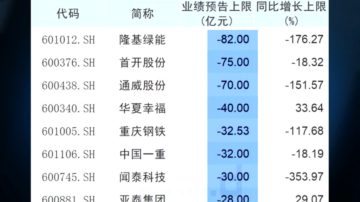【新唐人2014年11月10日訊】目前,中共官方正在進行新一輪的戶籍改革制度,已經被中共固定在農村幾十年「不許動」的農民,正在開始被移民小城鎮。學者認為,因為地方政府需要土地生錢,正在用加快城鎮化建設的方式,強迫農民城鎮化。而實際上享有諸多福利和公共服務的大城市,農民是難以進去的,即使考入大城市的農民大學生,想得到當地的戶口,也是難上加難。
目前,中共的又一輪戶籍改革,似乎已經由下毛毛雨式的宣傳,開始進入實質階段。據中共喉舌《新華社》報導,日前廣西北部灣已經制定出具體辦法,來實現中共7月份的戶籍制度改革。
中共國務院7月24號印發的《關於進一步推進戶籍制度改革的意見》中說,為適應推進新型城鎮化需要,要合理引導農業人口有序向城鎮轉移,有序推進農業轉移人口市民化。
原中國青年政治學院副教授楊支柱:「戶籍改革的思路主要是為征地,廉價取得農民的土地而制定的政策,政府賣地的錢比征地的錢10倍都不止,有一部分達到6、70倍。中國現在的戶籍隔離不是城鄉隔離,而是既得利益,發達地區對落後地區的隔離,大家都希望別人到我這兒來打工,但是我不給他戶口,我不給他福利。」
學者指出,由於中共把民眾的一部分稅收,用於大城市進行福利和公共設施建設,造成城郊和鄉村赤裸裸的貧困,甚至比非洲還窮﹔而大城市戶口的含金量則是越來越高。
據《南方週末》報導,畢業8年的正規本科畢業生,要花費45萬元才能拿到北京戶口。而經過中介轉手後,一紙北京戶口竟然可以炒到72萬。
在上海,戶口的價值不僅體現在子女教育、醫療保障等多方面的福利上,買房買車,擇偶方面的作用也很大,連生孩子街道還會補助3000元。調查顯示,擁有上海戶口的人中,有67%表示不會出賣戶口。而願意放棄戶口的平均「要價」超過了90萬。
最近中共國務院發改委規劃司長徐林說,一個農民工變成市民,平均需要花費8萬元到14萬,城市越大花費越多。
楊支柱:「誇大其辭,他的目的不是阻止把農民變成城市戶口,而是為了阻止農民到大城市來。」
獨立人口學者何亞福:「其實把農村戶口轉入城市,政府是賺錢的,到城市打工的人大多數是勞動力,要去交社保的,上海那些大城市,如果沒有外來人口交社保的話,它養老金制度是入不敷出的。」
實際上,據原中國青年政治學院副教授楊支柱此前發表的文章披露,交了社保的城市打工農民並不享受城市的福利。即使農民孩子大學畢業後在城市找工作也還是很困難,有的處境甚至還不如農民工,只好回農村要求恢復農民身份。當他們得知原來擁有的土地已經失去時,才大喊上當。但是他們上訴到法院時,因為他們的城市身份,還是得不到土地補償金。
共產黨奪權後,進行過幾次戶籍改革。50年代開始將國人身份,分為城市戶口和農村戶口,把農民固定在農村「不許動」,農民從此成為二等公民,農民想要出門做手藝,還要給生產隊交錢,要大隊裡證明不是壞人。
上世紀80年代後期,戶籍嚴控制度開始鬆動,大批農民開始進入城市打工,儘管農民工還是扮演召之即來揮之即去的角色,不過第一代農民工開始在城市紮根,他們結婚、生子,教育問題、醫療問題、勞動權益問題也隨之而來,而農村的留守老人,留守兒童造成的悲劇也層出不窮。
採訪編輯/劉惠 後製/舒燦
Hukou Reform Aims to Enclose Farming Land
For decades, Chinese peasants have been restricted
to the countryside.
The recent hukou system reform is ready to "invite" peasants
to move to small towns.
Experts believe the desperate need for cash has the local
governments turn to farming land.
Peasants are urbanized by speeding up urban construction.
But, to get into the big cities that enjoy many welfare
and social services isn't so easy for peasants.
Even the college graduates of the peasants find it
extremely hard to gain house registration in the cities.
The new round of household registration, known as hukou
reform, has entered a practical stage.
Xinhua News Agency reports, Guangxi Beibu Gulf has
manufactured specific measures to implement
the hukou reform that was announced in July.
Chinese State Council introduced hukou reform on July 24
which intends to transfer rural population to urban
in the need to promote new city development.
Former Associated Professor of China Youth University
for Political Sciences, Yang Zhizhu: "The hukou reform policy
is intended to acquire farming land at low prices.
Land sale makes at least 10 times more than land
expropriation, some even at 60 to 70 times more.
Household segregation in China is not urban vs. rural,
but the vested interests
of the developed areas vs. the backward areas.
Migrants are welcome to work,
but at the cost of no household registration or social welfare."
It has been pointed out that welfare and public facilities
have been done in major cities, while suburbs and rural areas
have been left out in complete poverty,
even worse than the poor countries in Africa.
The hukou in large cities comes at a very high price.
Southern Weekly reported a Beijing hukou would cost
450,000 yuan for a college graduate.
It can be flipped to as high as 720,000 yuan through an agent.
In Shanghai, the value of a hukou is reflected in a wide range
of benefits such as education, medical care, auto and housing.
It also plays a role in spouse picking.
Child bearing is also subsidized with 3,000 yuan.
A survey has shown that 67% of Shanghai residents
would not sell their hukou.
Those who are willing to give up their hukou demand
an average of 900,000 yuan in compensation.
Director of the Planning Division of National Development
and Reform Commission, Xu Lin, recently indicated
an average cost of 80,000 to 140,000 yuan to the government
for a migrant worker to become a city resident.
The bigger the city, the higher the cost.
Yang Zhizhu: "It is exaggerated.
Its purpose is not to prevent the farmers from obtaining
a city hukou, but to stop them from going to the big cities."
Independent demographer He Yafu: "In fact, transferring the
rural hukou to city will allow the government to make money.
People who work in cities are mostly the labor force
and the social security payers.
Without these people to pay for the social security,
big cities such as Shanghai will have a pension system
that can't make ends meet."
In fact, Yang Zhizhu’s previously published article has revealed
that migrants pay for the social security in the cities
but don’t enjoy the social welfare of the cities.
Their children still suffer from placement difficulty in the cities
after graduating from college.
Some encounter situations worse than the migrants
and thus demand to return to the rural areas.
But, they have lost their peasant entities with loss of the land.
When they realize that they have been deceived,
even their lawsuits won't win them land compensation
due to their city identities.
Since the Communists took over the regime,
China has experienced several hukou reforms.
In the 50s, Chinese were divided into urban hukou
and rural hukou.
Peasants were limited to the rural
and became second-class citizens.
To conduct craft businesses, peasants were required to pay
the local production team to provide proof
that they are not bad elements.
In the late 1980s, the household registration system began
to relax and many peasants became migrants to the cities.
The first generation migrants, even though still suffering
from being kicked around, have started to root in the cities.
They got married and had children.
The issues of child bearing, education, medical and labor rights
have cropped up too.
Tragedies of the elderly and the youths
who were left in the rural areas have been endless.
Interview & Edit/LiuHui Post-Production/ShuCan
目前,中共的又一輪戶籍改革,似乎已經由下毛毛雨式的宣傳,開始進入實質階段。據中共喉舌《新華社》報導,日前廣西北部灣已經制定出具體辦法,來實現中共7月份的戶籍制度改革。
中共國務院7月24號印發的《關於進一步推進戶籍制度改革的意見》中說,為適應推進新型城鎮化需要,要合理引導農業人口有序向城鎮轉移,有序推進農業轉移人口市民化。
原中國青年政治學院副教授楊支柱:「戶籍改革的思路主要是為征地,廉價取得農民的土地而制定的政策,政府賣地的錢比征地的錢10倍都不止,有一部分達到6、70倍。中國現在的戶籍隔離不是城鄉隔離,而是既得利益,發達地區對落後地區的隔離,大家都希望別人到我這兒來打工,但是我不給他戶口,我不給他福利。」
學者指出,由於中共把民眾的一部分稅收,用於大城市進行福利和公共設施建設,造成城郊和鄉村赤裸裸的貧困,甚至比非洲還窮﹔而大城市戶口的含金量則是越來越高。
據《南方週末》報導,畢業8年的正規本科畢業生,要花費45萬元才能拿到北京戶口。而經過中介轉手後,一紙北京戶口竟然可以炒到72萬。
在上海,戶口的價值不僅體現在子女教育、醫療保障等多方面的福利上,買房買車,擇偶方面的作用也很大,連生孩子街道還會補助3000元。調查顯示,擁有上海戶口的人中,有67%表示不會出賣戶口。而願意放棄戶口的平均「要價」超過了90萬。
最近中共國務院發改委規劃司長徐林說,一個農民工變成市民,平均需要花費8萬元到14萬,城市越大花費越多。
楊支柱:「誇大其辭,他的目的不是阻止把農民變成城市戶口,而是為了阻止農民到大城市來。」
獨立人口學者何亞福:「其實把農村戶口轉入城市,政府是賺錢的,到城市打工的人大多數是勞動力,要去交社保的,上海那些大城市,如果沒有外來人口交社保的話,它養老金制度是入不敷出的。」
實際上,據原中國青年政治學院副教授楊支柱此前發表的文章披露,交了社保的城市打工農民並不享受城市的福利。即使農民孩子大學畢業後在城市找工作也還是很困難,有的處境甚至還不如農民工,只好回農村要求恢復農民身份。當他們得知原來擁有的土地已經失去時,才大喊上當。但是他們上訴到法院時,因為他們的城市身份,還是得不到土地補償金。
共產黨奪權後,進行過幾次戶籍改革。50年代開始將國人身份,分為城市戶口和農村戶口,把農民固定在農村「不許動」,農民從此成為二等公民,農民想要出門做手藝,還要給生產隊交錢,要大隊裡證明不是壞人。
上世紀80年代後期,戶籍嚴控制度開始鬆動,大批農民開始進入城市打工,儘管農民工還是扮演召之即來揮之即去的角色,不過第一代農民工開始在城市紮根,他們結婚、生子,教育問題、醫療問題、勞動權益問題也隨之而來,而農村的留守老人,留守兒童造成的悲劇也層出不窮。
採訪編輯/劉惠 後製/舒燦
Hukou Reform Aims to Enclose Farming Land
For decades, Chinese peasants have been restricted
to the countryside.
The recent hukou system reform is ready to "invite" peasants
to move to small towns.
Experts believe the desperate need for cash has the local
governments turn to farming land.
Peasants are urbanized by speeding up urban construction.
But, to get into the big cities that enjoy many welfare
and social services isn't so easy for peasants.
Even the college graduates of the peasants find it
extremely hard to gain house registration in the cities.
The new round of household registration, known as hukou
reform, has entered a practical stage.
Xinhua News Agency reports, Guangxi Beibu Gulf has
manufactured specific measures to implement
the hukou reform that was announced in July.
Chinese State Council introduced hukou reform on July 24
which intends to transfer rural population to urban
in the need to promote new city development.
Former Associated Professor of China Youth University
for Political Sciences, Yang Zhizhu: "The hukou reform policy
is intended to acquire farming land at low prices.
Land sale makes at least 10 times more than land
expropriation, some even at 60 to 70 times more.
Household segregation in China is not urban vs. rural,
but the vested interests
of the developed areas vs. the backward areas.
Migrants are welcome to work,
but at the cost of no household registration or social welfare."
It has been pointed out that welfare and public facilities
have been done in major cities, while suburbs and rural areas
have been left out in complete poverty,
even worse than the poor countries in Africa.
The hukou in large cities comes at a very high price.
Southern Weekly reported a Beijing hukou would cost
450,000 yuan for a college graduate.
It can be flipped to as high as 720,000 yuan through an agent.
In Shanghai, the value of a hukou is reflected in a wide range
of benefits such as education, medical care, auto and housing.
It also plays a role in spouse picking.
Child bearing is also subsidized with 3,000 yuan.
A survey has shown that 67% of Shanghai residents
would not sell their hukou.
Those who are willing to give up their hukou demand
an average of 900,000 yuan in compensation.
Director of the Planning Division of National Development
and Reform Commission, Xu Lin, recently indicated
an average cost of 80,000 to 140,000 yuan to the government
for a migrant worker to become a city resident.
The bigger the city, the higher the cost.
Yang Zhizhu: "It is exaggerated.
Its purpose is not to prevent the farmers from obtaining
a city hukou, but to stop them from going to the big cities."
Independent demographer He Yafu: "In fact, transferring the
rural hukou to city will allow the government to make money.
People who work in cities are mostly the labor force
and the social security payers.
Without these people to pay for the social security,
big cities such as Shanghai will have a pension system
that can't make ends meet."
In fact, Yang Zhizhu’s previously published article has revealed
that migrants pay for the social security in the cities
but don’t enjoy the social welfare of the cities.
Their children still suffer from placement difficulty in the cities
after graduating from college.
Some encounter situations worse than the migrants
and thus demand to return to the rural areas.
But, they have lost their peasant entities with loss of the land.
When they realize that they have been deceived,
even their lawsuits won't win them land compensation
due to their city identities.
Since the Communists took over the regime,
China has experienced several hukou reforms.
In the 50s, Chinese were divided into urban hukou
and rural hukou.
Peasants were limited to the rural
and became second-class citizens.
To conduct craft businesses, peasants were required to pay
the local production team to provide proof
that they are not bad elements.
In the late 1980s, the household registration system began
to relax and many peasants became migrants to the cities.
The first generation migrants, even though still suffering
from being kicked around, have started to root in the cities.
They got married and had children.
The issues of child bearing, education, medical and labor rights
have cropped up too.
Tragedies of the elderly and the youths
who were left in the rural areas have been endless.
Interview & Edit/LiuHui Post-Production/ShuCan


